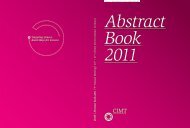Abstract Book 2010 - CIMT Annual Meeting
Abstract Book 2010 - CIMT Annual Meeting
Abstract Book 2010 - CIMT Annual Meeting
You also want an ePaper? Increase the reach of your titles
YUMPU automatically turns print PDFs into web optimized ePapers that Google loves.
013 Babiarova | Therapeutic vaccination<br />
Development of different types of vaccine against WT1<br />
tumor antigen<br />
Katarina Babiarova, Luda Kutinova, Eva Brabcova, Jitka Krystofova, Petr Hainz and Sarka<br />
Nemeckova<br />
Department of Experimental Virology, Institute of Hematology and Blood Transfusion, Prague 2, U Nemocnice 1,<br />
CZ-128 20, Czech Republic<br />
The Wilms’ tumor gene 1 (WT1) encodes a tran-<br />
scription factor, initially identified as a suppressor<br />
in the etiology of Wilms’ tumor. It is expressed at<br />
high levels in a variety of human cancer including<br />
leukemia and various types of solid tumors. WT1<br />
protein has been reported to serve as target antigen<br />
for tumor-specific immune responses.<br />
The aims of this study were to prepare experimental<br />
vaccines of different type against WT1 tumor<br />
antigen and to evaluate their potency in immunotherapy<br />
of tumors in mouse model. We prepared<br />
DNA vaccine pBSC/WT1-GUS based on the fusion<br />
gene β-glucoronidase from E.coli (GUS) which<br />
was shown previously to have superior anti-tumor<br />
effect. We also constructed the viral vaccine P13-<br />
WT1-GUS based on the recombinant vaccinia virus<br />
(rVACV) strain P13 with the expression of fusion<br />
protein WT1-GUS under the control of either earlylate<br />
(H5) or synthetic early-late (E/L) VACV promoters.<br />
Every vaccine contains a fragment of murine<br />
WT1 gene coding for a peptide with the length of<br />
155aa (94.-249.aa) containing several CTL epitopes.<br />
We also used peptide vaccines derived from WT1<br />
with motifs predicted to bind to Db murine MHC<br />
I. The efficacy of these vaccines was tested in the<br />
immunization experiments in mice. The ELISPOT-<br />
IFNγ assay and measurement of the intracellular<br />
IFNγ was used to detect T cell immune response<br />
specific for WT1 peptides. Highest response was<br />
elicited by the RMFPNAPYL peptide. The immunization<br />
of mice either with pBSC/WT1-GUS or P13-<br />
WT1-GUS in combination with WT1 peptide vaccine<br />
P(126-135) as a booster revealed a low WT1 peptide<br />
specific T cell immune response in about 50% of<br />
immunized mice. Similar results were found after<br />
the immunization of mice using combination of all<br />
three types of vaccines. Anti-tumor effect of immunization<br />
with the different combination of our<br />
three vaccines were determined in mouse model of<br />
WT-1 positive tumors induced by the TRAMP-C2<br />
cells. We observed that priming with rVACV based<br />
vaccine combined with booster with RMFPNAPYL<br />
peptide in incomplete Freund adjuvant resulted in<br />
enhancement of the growth of TRAMP-C2 cells in<br />
mice. However immunization with one vaccine<br />
only (P13-WT1-GUS) was able to decelerate the<br />
growth of TRAMP-C2 tumors.<br />
This work was supported by grants NS 10660-3/2009 from IGA<br />
MZ ?R and 78608 from GAUK.<br />
49



